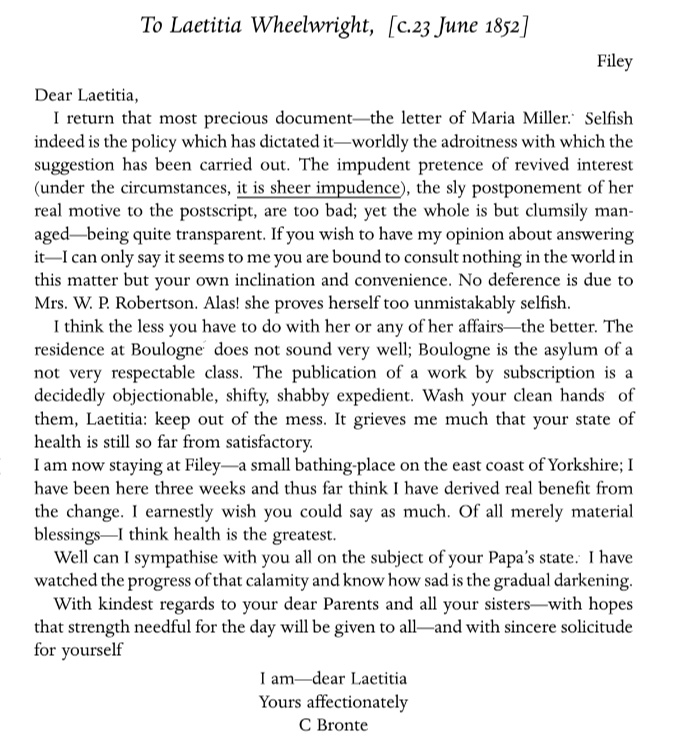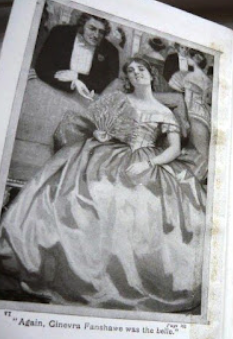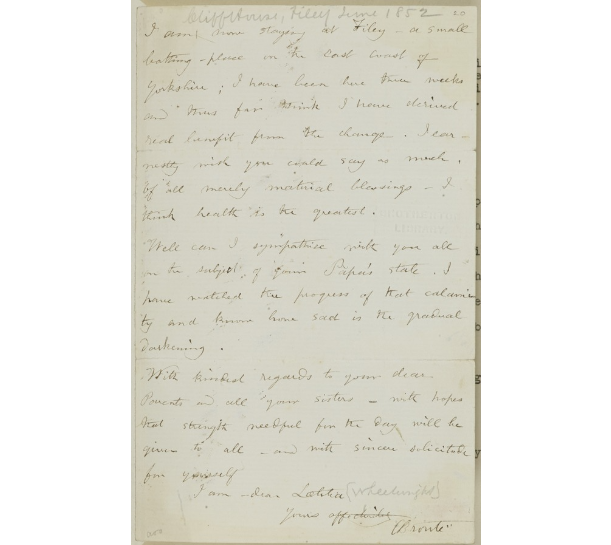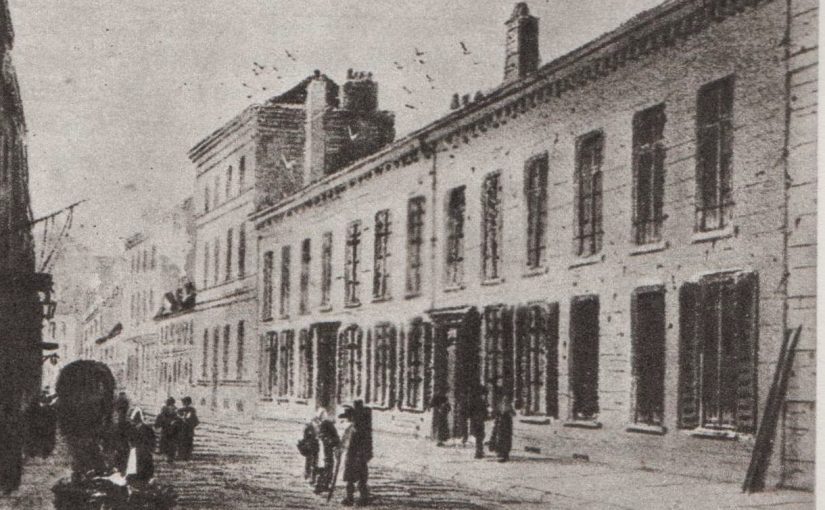Summer has finally arrived, so make the most of the sunny weather while you can. Of course, wherever you are, on a patio or beach, it’s always improved if you have a good book to hand. On this day in 1852 we know that Charlotte Brontë was walking the fine sands of Filey on the Yorkshire coast, and she wrote from there to her friend Laetitia Wheelwright about an old schoolmate Maria Miller. We’ll take a look at that letter in today’s post, for it also gives us an insight into the Brontës’ time in Brussels, and to Charlotte’s magnificent novel Villette.
Laetitia Wheelwright was a pupil at the Pensionnat Heger in 1843, at the time that Charlotte Brontë had changed from being a pupil there to being a teacher. She was perhaps the only real friendship that Charlotte made in Brussels (if we discount Monsieur Heger) and it was a lasting one, as we see from the fact that Charlotte is writing to her nearly ten years later.

Laetitia’s father was an English doctor, and his four daughters attended the Pensionnat Heger school in Brussels. Laetitia, born in 1828, was the oldest of the four daughters, and she quickly became Charlotte’s favourite pupil. Frances Wheelwright later recalled how Charlotte was first attracted to Laetitia after seeing her standing on a stool watching misbehaving Belgian pupils ‘with an expression of contempt and disgust’. As anyone who has read Villette, or especially The Professor, knows this was a view shared by Charlotte herself. Many years later Charlotte often visited the Wheelwright family at their London home when she was in the city, so let us turn to a letter Charlotte Brontë sent there exactly 172 years ago today:

It seems that Laetitia has forwarded a letter from Maria Miller, seeking their advice. Charlotte knew Maria too from their time in Brussels, and we can read between the lines to see why Maria had been in correspondence with Charlotte. The Miller family have sought help from their present abode in Boulogne, France. Charlotte warns that “it is the asylum of a not very respectable class.” In fact, it was a place where many British families fled to hide from their creditors, just as Becky Sharp does in Thackeray’s Vanity Fair.
Maria has presumably been writing to Laetitia to seek funds to escape her debts, but Charlotte tells Laetitia in no uncertain terms to wash her hands of her. Charlotte twice calls Maria selfish, as well as impudent and worldly – it’s fair to say that Charlotte was not a fan of Maria Miller, and in fact it is believed that she based the character of the shallow, preening Ginevra Fanshawe in Villette upon Maria.

Charlotte’s dislike for Maria Miller lasted, just as her affection for the Wheelwright family lasted. Nevertheless when she visited the family in London she never let them know the reason for her visits to the capital, and even her close friend Laetitia never knew that Charlotte was a writer. As she confessed in an 1849 letter to publisher George Smith: “they [the Wheelwrights] are of the class, perfectly worthy but in no sort remarkable – to whom I should feel it quite superfluous to introduce Currer Bell [Charlotte’s pen name]; I know they would not understand the author.”
Incidentally, when Charlotte sympathises with Laetitia about her father’s ‘gradual darkening’, she was speaking quite literally – Laetitia’s father, like Charlotte’s, was going blind.

Brussels changed Charlotte Brontë, Emily Brontë, and Laetitia Wheelwright forever, so I’m delighted to announce that I’ve been asked to give a talk to the Brussels Brontë Group in May next year. I’ll bring you more details closer to the date. You can also buy tickets to see me talking all things Anne Brontë and Agnes Grey at the Bradford Literature Festival on Sunday 7th July. Tickets are available right now at this link: https://www.bradfordlitfest.co.uk/event/anne-Brontë-and-agnes-grey-parallels-of-resilience-and-reality/
Whether you’re in Brussels, Bradford or anywhere in between I wish you a happy Sunday and I hope to see you next week for another new Brontë blog post.

Thank you for this, Nick, it’s always interesting to read Charlotte’s correspondence with friends. The letter from Charlotte to Laetitia shows that Charlotte was extremely fond of Laetitia and they shared much in common, so it’s quite hard to understand why she wouldn’t have confided in her friend that she was now a published author, especially as she stayed with the family in London! What were Laetitia’s feelings when she found out, I wonder?